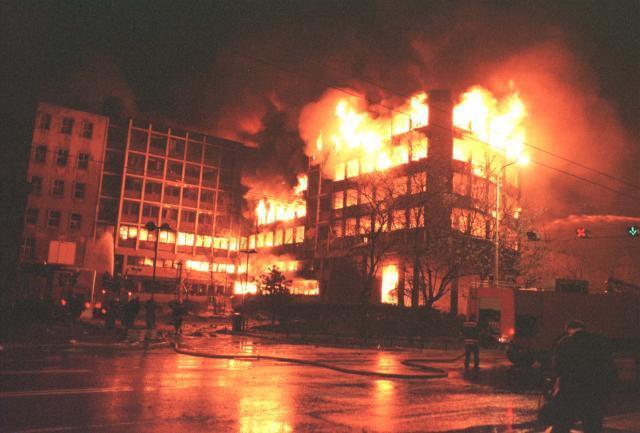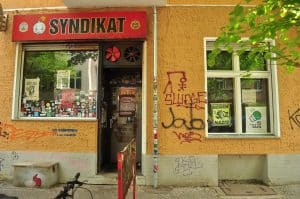The military invasion by Russia of Ukraine is reprehensible. Starting a war can only bring hardship, death, and even more social inequality. However, that doesn’t mean NATO’s military deployment, or involvement in the conflict, could be a good thing.
There is a fairly widespread discourse in the media and from governments that tends to associate NATO with the defense of the freedom of peoples against authoritarian governments. But history has demonstrated the opposite, that its true function is to see to the interests of imperialist powers, especially those of the United States and, to a lesser extent, Germany, England, and France. And that where it has intervened, in supposed defense of peace, it left thousands of deaths and deep social crises.
Originally established in 1949 to stop the Soviet advance, NATO became even stronger after the dissolution of the USSR in 1991. Since that time, it has doubled its number of member states. It was also at that time that NATO began to intervene actively in a series of wars in different parts of the world.
Kosovo War
The year was 1999. The territory that formed the former Yugoslavia had been plagued by geopolitical tensions and independence struggles since the fall of the Soviet Union. Kosovo had been the scene of a dispute since the preceding year between Serbian forces and ethnic Albanian rebels who were demanding regional autonomy.
NATO decided to intervene in favor of the ethnic Albanians, but it did so not to defend the right to self-determination of the Kosovo Albanian people or to end the oppressive conditions to which they were subjected. Rather, it did so to install a government favorable to the United States and Europe, and thus limit Russia in its former zone of influence.
NATO’s intervention involved 600 planes from 13 countries bombing Kosovo, Serbia, and Montenegro, leaving more than 1,500 civilians dead and thousands injured. It also destroyed cities. The use of uranium bombs sparked an environmental crisis.
The result was the fictitious independence of Kosovo nine years later, in February 2008. Far from being a sovereign country, it became dependent on the UN and NATO countries, who turned it into a quasi-military base in order to control the Balkan region and the rest of Eastern Europe.
War in Afghanistan
The attack on the Twin Towers in New York City on September 11, 2001, marked the beginning of the so-called “War on Terror.” And with it came the invasion and occupation of Afghanistan by U.S. and European military forces that December.
Confronted by the powerful forces of NATO member states, irregular armies and small militias in the region fought back, employing all sorts of “irregular” methods. In many cases, these groupings were supported by the locals, who saw them as a way to defend against the imperialist aggression by the country’s invaders.
The invasion of Afghanistan was justified with the excuse that bin Laden, leader of the organization behind the 9/11 attacks, was taking refuge there. But the interests of the United States and Europe in the region went further, to include the not just Muslim Afghanistan but the Arab World as well. Controlling that key region was seen as providing a geopolitical advantage over Russia and China. War in the region created huge profits for companies in the imperialist aggressor countries.
The war in Afghanistan lasted two decades and ended with the humiliating departure of the NATO armies, with the country returned to the hands of a Taliban government. As a result of the war, the population was devastated — the average age of the population today is 18. The war left hundreds of thousands dead, and outright civil war remains a possibility.
Yet another of the consequence of the invasion of Afghanistan is the proliferation of xenophobic policies and discrimination against the Muslim population in the NATO states’ own countries.
Libyan Civil War
For five months in 2011, NATO bombed and intervened militarily in the North African country of Libya. On March 17, the Security Council voted “to take the necessary measures to protect civilians” and more than 20 countries participated either by sending weapons or becoming directly involved in the conflict.
NATO’s actions were aimed at recovering an offensive position in the region in the context of the revolutionary process in the Middle East and North Africa known as the Arab Spring. Muammar Gaddafi, president of Libya for 42 years, was one of the region’s leaders ousted as a result of Arab Spring mobilizations. He had enjoyed a good relationship with the Soviet Union while in power, but his government had been deteriorating for years. The United States and Europe, in addition to participating militarily, financed rebel groups with weapons and training. Gaddafi was assassinated by a mob of US-backed opponents on October 11, 2011 while an internal struggle broke out in the country that divided power into two governments. Then Secretary of State Hillary Clinton laughed about it, remarking “We came, we saw, he died.”
NATO took advantage of these uprisings not for “humanitarian aid,” but to increase its territorial control by installing a new government favorable to Western interests. Libya plays a key role in the geopolitics of the region due to its large gas and oil reserves, in addition to being strategically located for controlling refugees fleeing famine and conflict in sub-Saharan Africa. In this war, France and England directed military operations and benefited the most from the oil deals.
Far from peace, Libya continues to be plagued by a civil war. NATO forces caused a genocide in the region. The rights of Libyans were violated and millions of people were displaced as a result of hunger and utter destruction.
The True Face of NATO
These are some of the stories that show the true face of NATO, but they are not the only ones. Some other examples should not be forgotten, such as NATO’s intervention in the Malvinas Islands in 1982, in the Iraq War beginning in 2003, and in Georgia in 2008.
Ukraine will not be the exception. Neither the intervention of Europe and the United States, nor Putin’s invasion, should be seen as progressive responses to the popular needs of one of the poorest countries on the continent. We already know what to expect If the war continues: multi-billion dollar profits for the capitalists, increased military might for the major powers, and hardship and growing discontent among the working class and oppressed.
First published on March 1 in Spanish in La Izquierda Diario.
Translation by Left Voice










